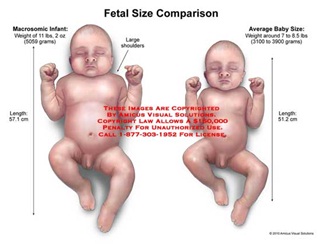Fetal Macrosomia Causes, Symptoms, Diagnosis and Treatment

What Is Fetal Macrosomia?
Fetal macrosomia is a term used to describe a newborn with an excessive birth weight.
Regardless of his/her gestational age, a baby diagnosed with fetal macrosomia has a birth weight of more than 8 pounds, 13 ounces (4,000 grams).
Fetal macrosomia may lead to complications in vaginal delivery and increases the risk of injuries to the baby during birth.
Moreover, it also increases the risk of health problems after birth.
Causes Of Fetal Macrosomia:
Fetal macrosomia can be caused by:
The following factors increase the probability of having a baby with fetal macrosomia:
- Maternal diabetes.
- Pre-gestational and gestational diabetes during pregnancy can lead to fetal macrosomia.
- A history of fetal macrosomia.
- Maternal obesity.
- Excessive weight gain during pregnancy
- Previous pregnancies.
- The risk of fetal macrosomia increases with each pregnancy.
- Having a boy.
- Male infants typically weigh slightly more than female infants.
- Overdue pregnancy.
- Pregnancies which continue by more than two weeks past their due dates have higher likelihood of the baby having fetal macrosomia.
- Maternal age.
- Women who older than 35 are more likely to have a baby diagnosed with fetal macrosomia.
Symptoms Of Fetal Macrosomia:
Macrosomia is very difficult to diagnose during pregnancies.
However, the following signs and symptoms may be exhibited:
- Large fundal height
- Excessive amniotic fluid (polyhydramnios)
Diagnosis Of Fetal Macrosomia:
The following tests help in diagnosing fetal macrosomia:
- Ultrasound
- Antenatal testing
Treatment Of Fetal Macrosomia:
If fetal macrosomia is diagnosed, the doctor may recommend a C-section in order to avoid injury to the baby.
However, vaginal delivery is not out of question either. But, it would need to be done in a hospital so that complications can be tackled with.
By : Natural Health News




